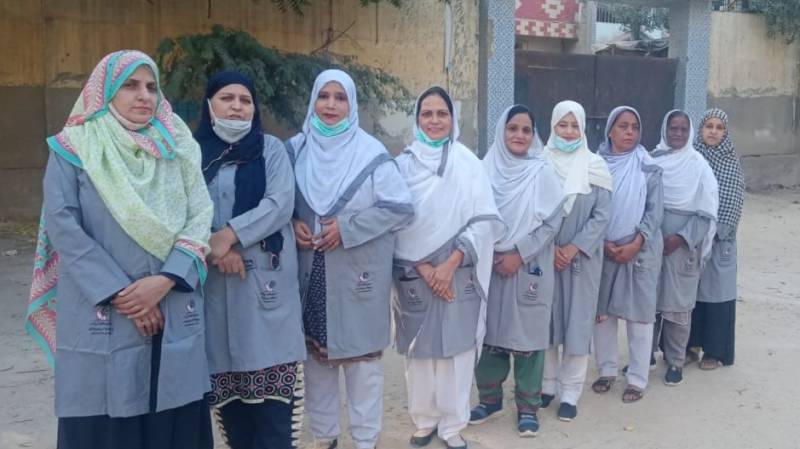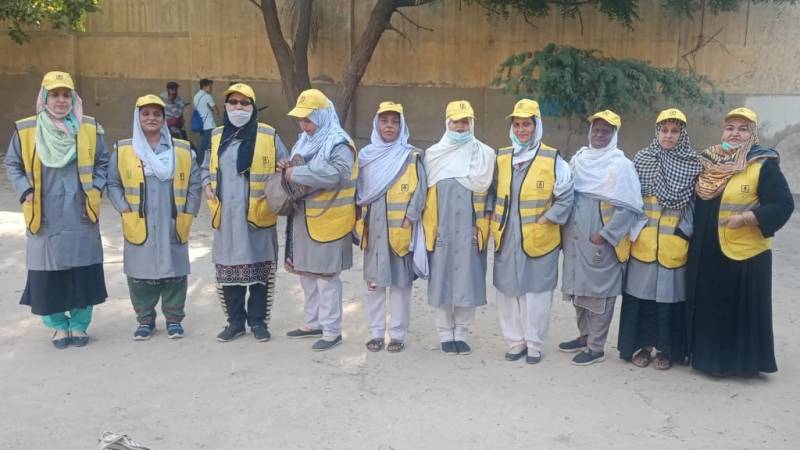
No one should be expected to continue working without being fairly compensated. The lady health workers (LHWs) fall into this category of employees who deserve proper remuneration for their efforts.
The role of LHWs is important in Pakistan, where health is a low priority for the authorities. Thousands of women are deprived of basic healthcare, and many die from preventable health issues.
Before the LHW programme was implemented in the early 1990s, thousands of women went through life without ever consulting a doctor or getting any proper medical care. For many women, LHWs are the only link to the health sector. Despite their valuable contribution, they are killed and abused for their work.
Mobina Shafeeq, a lady health worker based in Karachi, said, “While imparting awareness about women's and children's health, our efforts extend to empowering them with knowledge about their rights and improving their overall quality of life.”
The LHW programme was launched in 1994 in Pakistan, focusing on launching a family planning campaign across the country. It was meant to conclude at the end of the campaign. To execute this, “LHWs were hired for a nominal salary,” said Maqsood Ahmed, a trade unionist and labour rights expert.

The concept was to train women fieldworkers to help women access healthcare facilities. Women who had studied up to middle school and were above age 35 were hired for the programme. They were given 15 months of training on how to go from door to door and dispense basic health services to the marginalised women.
“When the campaign concluded, the LHWs were absorbed by the health department. However, they were not granted the same status as other health department employees due to the absence of a service structure for them,” emphasised Ahmed.
He added that the main reason for the non-payment and delayed salaries of LHWs is the absence of a service structure – “This is also why LHWs are working in the same grade without receiving any increments for years or pension after retirement.”
The LHWs formed the All Lady Health Workers' Programme Union (ALPU) giving them a platform to not only amplify their voices but also give them strength in numbers. Led by chairperson Bushra Bano Arain, the ALPU worked constantly to spread awareness among the members through workshops and other activities to empower them.
Maqsood Ahmed said that the main reason for the non-payment and delayed salaries of LHWs is the absence of a service structure – “This is also why LHWs are working in the same grade without receiving any increments for years or pension after retirement"
Bushra Arain began working as an LHW when she was young. “Over the years, I have realised that if we don’t stand up for ourselves, others will only try to push us back. I decided to stand up for other LHWs and help them understand their rights.”
Bushra expressed, "LHWs are tasked with more than their routine responsibilities. Working in the field, we've become targets for terrorists. Although our primary role is to deliver health services, we've been assigned security duties at polling stations and conducted census, among other tasks."
She said LHWs are not paid for their extra work, but “they continue to do so fearing sacking”.
“Upon joining the union, I came to realize the multitude of rights women possess, and I believe their lives could significantly improve if only they were more aware of these rights,” said Mobina Shafeeq, a lady health worker based in Karachi.
In 2012, the Supreme Court issued an order to regularise LHWs. It mandated the development of a service structure for them. Despite the court's directive, the order was not executed as intended. While some LHWs were regularised, confusion arose regarding pension eligibility for those regularized after 2012, as a minimum of 10 years of experience is required. This situation created significant challenges for those who had been working for two decades, with hundreds of LHWs being deprived of their rightful benefits.
Commenting on the complexities of the situation, Maqsood said, “After the 18th amendment, the LHWs became the responsibility of the provincial governments, which was unable or unwilling to develop a proper service structure for them. This began causing a lot of problems for the LHWs. They continued to work despite the serious terror threats and life threats, many paying with their lives.”
About 118 LHWs have been killed in the field so far, while many more have been injured. These workers are expected to work beyond their prescribed duties and not expect to be paid. Seeing this situation, “the ALPU began campaigning strongly, demanding that the apex court’s orders be implemented properly,” he added.
Maqsood worked closely with NOWCommunities (an NGO that works with trade unions on labour rights) to train the LHWs about the importance of trade unions and their other rights – “It was heartening to see the response to the union’s call last year against the non-payment of salaries. It showed that the LHWs were no longer going to allow anyone to take them for a ride.”
LHWs received a Covid allowance during the vaccination campaign, which provided some relief to low-paid workers. However, this allowance was rescinded immediately after the campaign concluded. The ALPU leadership criticised the decision, highlighting that LHWs operate in highly perilous conditions, putting themselves and their families at risk.
Bushra and other LHWs were beaten up and even arrested when they protested in 2022.
The government funds allocated to healthcare are insufficient despite the abysmal health indicators in the country. During the fiscal year 2023-23, the government allocated Rs24.21 billion for the healthcare sector – 2.8 percent of the total development budget and a mere 0.05 percent of the gross domestic product (GDP).
Pakistani women are the most vulnerable when it comes to health. Just the high maternal mortality rate indicates how bad the situation is in the country. Pakistan has one of the highest maternal mortality rates in South Asia, which makes the LHWs more important in Pakistan.
According to a survey in 2018 conducted by the National Institute of Population Studies, “the MMR is nearly 26 percent higher in rural areas as compared to urban areas due to a major difference in health care services provided to people living in urban areas as compared to those living in distant regions.
Mobina Shafeeq said, “We try to help women a lot through our work and advice to bring a good change in society. The impact may be extremely low as it is just the beginning, but I am sure if LHWs keep persevering, they will be able to empower women in a small way, which can go a long way and improve the life of someone down the line.”

